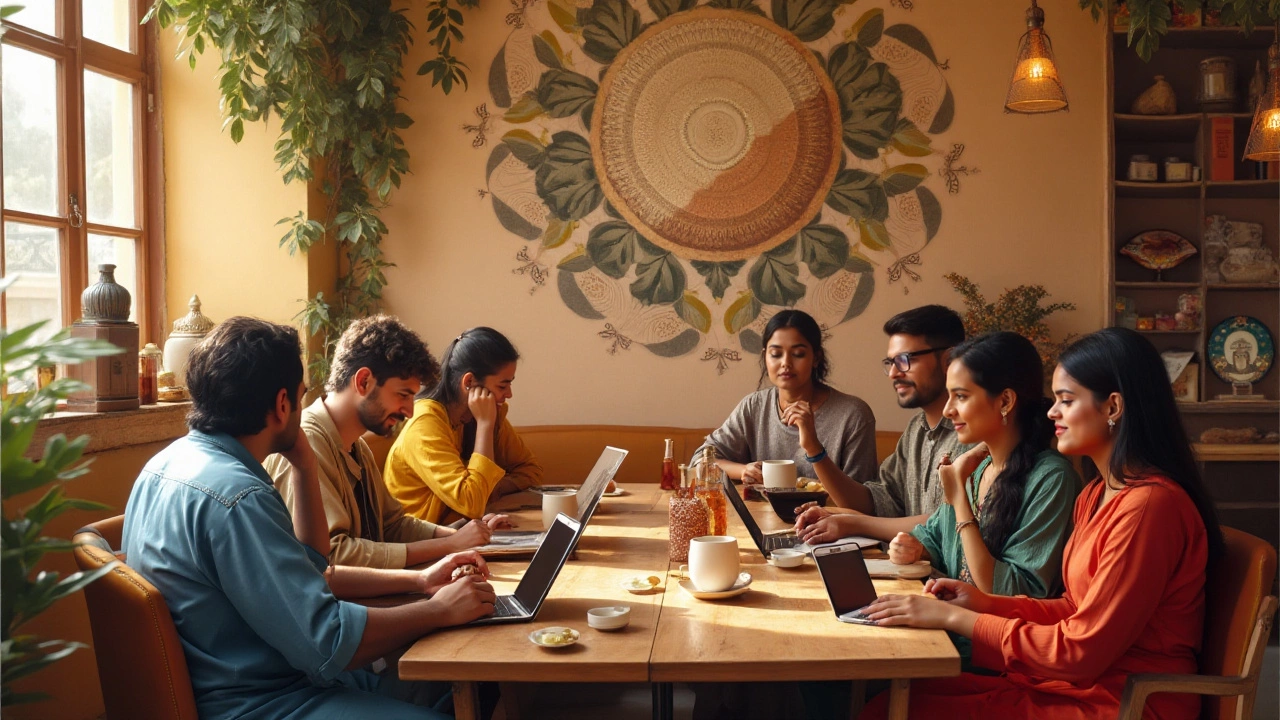It's a brave new world for bloggers, with 2024 offering a plethora of exciting and profitable niches for those in search of success. As the digital landscape continues to evolve, so do the opportunities for innovative content creators. If you're keen on finding a niche ripe for income, this is your chance to dive into some of the most appealing subjects.
From health and wellness to sustainable living, niches that seemed niche yesterday are turning into full-blown trends today. Bloggers who can capitalize on these areas can not only expand their readership but also tap into lucrative monetization strategies. Let's navigate these promising areas and see where your voice could shine the brightest in 2024.
- The Surge in Health and Wellness Content
- Sustainable Living Becomes a Blog Staple
- Financial Independence and Personal Finance Trends
- The Rise of Remote Work and Digital Nomadism
- Educational Content: A Growing Opportunity
The Surge in Health and Wellness Content
The health and wellness industry has witnessed a remarkable boom over the past few years, and its digital offshoot—the blogging sphere—is no exception. Far from a fleeting trend, this sector reflects a profound and enduring shift in how people approach their lives. A key reason for this surge is a growing awareness of mental and physical well-being, fueled by easy access to information and a desire to lead healthier, more fulfilling lives. Bloggers in this space provide valuable content that addresses these needs by offering tips, advice, and personal stories that resonate with a wide audience. From workout regimens to mental health tips, nutritious meal plans to mindfulness practices, the scope for content creators seems limitless. Investment in content that educates and empowers readers has shown that this trend isn't just about audience growth but also about community building and fostering genuine connections.
One major factor driving the popularity of health and wellness content is the tangible impact such information can have on one's quality of life. As readers actively seek methods to enhance their mental health, physical fitness, and overall well-being, blogs serve as a credible source of guidance and inspiration. This is not merely a one-way street; engagement is key as bloggers interact with their audience, often responding to queries, tailoring content to feedback, and sharing user testimonials about specific practices or products. Considering the pandemic's profound effect on global consciousness, more people than ever before are tuning into content that equips them to navigate stress, anxiety, and the nuances of personal health management.
For those looking to start a blog in this niche, there's an expansive territory of sub-genres to explore. Opportunities abound in yoga and meditation, diet-based lifestyles like keto or veganism, and even biohacking, which taps into the burgeoning interest in high-tech health solutions. Successful bloggers often find their unique twist or personal angle on a broad topic, allowing them to engage with niche audiences effectively. As supported by a survey conducted in 2023, 72% of participants indicated a greater focus on purchasing products or services endorsed by health bloggers they trust. This highlights not just the potential for content growth but also the range of monetization options available in this profitable blogging niche.
Harvard T.H. Chan School of Public Health once remarked, "Well-being is not a destination but a journey."With this perspective in mind, it’s plain to see why health and wellness blogs aren't simply beneficial financial opportunities; they also serve meaningful and impactful roles. They bridge the gap between desire and achievement, offering blueprints for readers striving for a healthier life. Crafting genuine, data-backed guidance that blends personal experience with expert advice can make content in this niche invaluable. Bloggers can harness this wave by continuously offering creative solutions, diverse perspectives, and credible information that contribute to this ongoing evolution in health awareness.
Finally, maintaining credibility in the health and wellness niche is vital, as misinformation can erode trust. Credibility is built by providing well-researched information, often backed by citations from authoritative sources, and transparently acknowledging the limits of one's expertise. By balancing the line between personal insights and scientifically-grounded advice, bloggers can not only capture the growing audience's attention but also foster loyalty and assure readers they are a reliable source of knowledge in this rapidly expanding space.
Sustainable Living Becomes a Blog Staple
In the past few years, the emphasis on sustainable living has gradually crept from being a niche topic to becoming a major talking point across many blogging niches. As people grow increasingly aware of the impact their actions have on the planet, there is a genuine push towards more eco-conscious habits. The concept of sustainable living is all about taking practical steps that minimize harm to the environment, so it’s hardly surprising that there's been an explosion of blogs dedicated to this topic. Whether it's related to minimizing waste, making greener choices at home, or embracing renewable energy sources, the demand for authentic advice and real-life examples is on the rise.
A primary driver behind this shift is the increasing urgency of climate change discussions, which has touched every corner of society—from policymakers to ordinary citizens. Blogs can conveniently navigate this conversation, offering unique perspectives, personal stories, and innovative ways to live more sustainably. According to a Nielsen study in 2023, 73% of global consumers are now willing to change their consumption habits to reduce their environmental impact—a significant leap in interest from previous years. For bloggers, this translates to a vast audience eager to consume content that guides them through the transition to sustainable practices. An adventurous pivot toward sustainable content not only aligns with ethical imperatives but also taps into a burgeoning market.
The beauty of sustainable living content is its universality and adaptability. Bloggers in this space aren't limited to one particular form of media. Some delve into video tutorials on eco-friendly DIY projects, while others create downloadable guides or printable resources to help readers track their sustainability efforts. Sustainability in fashion, also known as 'slow fashion', is gaining considerable traction, proving fertile ground for bloggers to explore topics like ethical brands, materials, and reducing one's fashion carbon footprint. When done tactfully, integrating personal anecdotes can transform a blog into a powerful agent of change, encouraging daily eco-conscious decisions among readers.
To enhance the richness of their offerings, bloggers may craft tutorials, share personal journeys, or even spotlight stories featuring readers' success in sustainable living. Incorporating expert opinions and data-backed strategies enriches content's reliability and helps cultivate a dedicated readership. For example, a study published in the Journal of Environmental Psychology suggests that individuals are more likely to adopt sustainable habits when they see clear benefits in their lives. This creates an opportunity for bloggers to weave data into their narratives, offering readers both motivation and proof of positive environmental impact.
Monetization can be symbiotically aligned with sustainability goals. Bloggers might affiliate with brands that produce eco-friendly products—think reusable household items, biodegradable packaging, or plant-based foods—or offer products or services that promote green lifestyles. Subscription-based access to exclusive sustainable living content, online workshops, or community forums are other revenue streams bloggers may pursue. This not only underscores the blog's commitment to a sustainable future but also nurtures a strong community of like-minded individuals. As you explore these realms within your blogging endeavors, expect topics like carbon footprints, zero-waste challenges, and minimalistic giggles to beckon your creative flair.
In the competitive terrain of blogging niches, sustainable living transcends trends by becoming a movement with tangible benefits for society and the planet. It's an inspiring niche that doesn't just offer diversified opportunities for content creation but also invites bloggers to make an impact through their words. To quote Jane Goodall, a pioneering conservationist, "What you do makes a difference, and you have to decide what kind of difference you want to make." Bloggers who embrace sustainable living as a theme are not only setting themselves apart but are also taking part in a critical global conversation, making this a pivotal niche to embrace in 2024.

Financial Independence and Personal Finance Trends
Financial independence has taken center stage for many in recent years, propelled by a mix of economic uncertainty and a growing desire for autonomy. The blogging niches surrounding personal finance have flourished as more individuals seek actionable advice to manage, save, and grow their money. With a shifting workforce and the gig economy expanding, the way people manage their finances has fundamentally changed. Bloggers focusing on these topics are not just influencers but trusted advisors for their readers, unraveling complex financial ideas into digestible content.
With the advent of technology that democratizes financial tools, there's been a rise in apps and platforms aimed at enhancing financial literacy. From budgeting software to investment platforms that cater to the layman, technology has made understanding finance less intimidating. One key fact is that approximately 63% of millennials say they use at least one app to manage their money, highlighting a digital trend that bloggers can align with. This shift presents a golden opportunity for those who provide guidance on effectively using these technologies to reach financial goals.
The FIRE Movement
The FIRE (Financial Independence, Retire Early) movement has gained a fervent following, making it a standout topic within personal finance blogs. What once seemed like an audacious goal is now perceived as attainable through disciplined saving and investment strategies. This movement has cultivated a dedicated community eager for content that includes saving hacks, investment tips, and motivational success stories. As more people embrace this philosophy, there's a growing demand for case studies and strategies that demystify the path to early retirement. With the right content, bloggers can tap into this enthusiastic audience, providing them with inspiration and tools to reach an ambitious goal.
"Financial independence is not a pipe dream but a state of mind and discipline," says noted financial expert Suze Orman, capturing the essence of the growing culture around being financially free.
Interestingly, the demographic seeking financial advice online is diverse, spanning different ages and backgrounds. This inclusion brings varied perspectives, enriching the conversation around personal finance. For bloggers, this means crafting content that resonates with both beginners budgeting their first paycheck and retirees managing their nest egg. By exploring targeted advice for different life stages, a personal finance blog can become a go-to resource.
Exploring Passive Income Streams
The concept of passive income has appealed to audiences worldwide, lured by the idea of earning more with less effort. This interest has sparked countless blogs discussing profitable blogging and investment opportunities that allow income to trickle in even while one sleeps. From real estate crowdfunding to dividend investing, there's a treasure trove of techniques that people are eager to learn and leverage. Highlighting success stories and providing detailed guides on setting up passive income streams can significantly boost a blog's popularity in this field.
The fascination with financial independence and personal finance trends continues to grow strong, showing no signs of waning. As these topics evolve, they offer bloggers fertile ground to share valuable insights and establish a meaningful connection with readers endeared by the promise of a better-managed financial future. Bloggers who understand these trends can not only build engaged communities but also transform their platforms into profitable hubs of genuine, impactful advice.
The Rise of Remote Work and Digital Nomadism
The world of work has undergone a remarkable transformation in recent years, and nowhere is this more apparent than in the surge of remote work and digital nomadism. As technology continues to advance, the barriers that once kept us tethered to a physical office are rapidly dissolving. This trend, which gained considerable momentum during the global pandemic, shows no signs of slowing down. Many companies have reimagined their operational models, allowing employees more flexibility in where and how they work. This shift has cultivated a new lifestyle trend where professionals can work from exotic locations or cozy home setups, effectively blending work and travel.
The benefits of remote work are myriad, not just for employees, but for employers as well. Companies now have access to a global talent pool, unrestricted by geographical boundaries. This diversification can bring fresh perspectives and innovation, driving business growth in novel directions. For workers, the appeal of living life on their own terms, exploring new cultures, and escaping the confines of conventional offices is undeniable. The ability to work according to personal rhythms rather than a rigid schedule has also led to increased job satisfaction and productivity. According to a report by Owl Labs, remote workers are 22% happier than their office-bound counterparts.
"Remote work isn't just a trend; it's a revolution in how we interact with the workplace," said John D. Howard, an expert on workplace flexibility.
Digital nomadism, a lifestyle subset of remote work, has become increasingly feasible and attractive. These free-spirited careerists have turned airports, cafés, and remote beaches into their offices, all the while contributing to a multinational, diverse economy. Nomadic workers often steer towards professions that allow location independence, such as software development, writing, marketing, and design. The demand for freelancers in these fields has soared, offering flexibility and potentially higher earning potential than traditional employment. The inclination towards freelancing has also been propelled by the growing accessibility of global job platforms like Upwork and Freelancer, simplifying connections between clients and a dispersed workforce.
Countries around the globe are recognizing the economic benefits of attracting digital nomads. Many nations, such as Portugal and Estonia, have introduced specific visas designed to welcome these tech-savvy itinerants. By offering tax benefits and streamlined processes, these destinations incentivize digital nomads to plant temporary roots. Moreover, the increase in co-working spaces worldwide helps digital nomads create community ties, fostering networks that blend work, travel, and personal growth. Such communities have become incubators for innovative ideas, collaborative projects, and entrepreneurial ventures, proving beneficial for both individuals and the host countries.
For those looking to capitalize on the rise of remote work, blogging on this subject offers vast potential. Covering topics such as beneficial tools for digital nomads, tips for maintaining work-life balance on the road, or guides on obtaining remote work visas, can attract a significant audience eager to embrace this changing work landscape. With the right content, bloggers can engage with a community that values productivity, exploration, and freedom—key pillars of the remote work movement. Emphasizing the latest trends, essential tools, and personal experiences can create a well-rounded perspective, enriching the lives of fellow travelers in this exciting era.

Educational Content: A Growing Opportunity
In recent years, the demand for educational content has skyrocketed, paving a path rich with possibilities for those keen to share knowledge. Educational blogs have become more than just supplementary resources; they are essential tools for learners from all corners of the world. Blogging niches focused on education offer a wide-stretching target audience—everyone from curious children to adults pursuing lifelong learning. The potential for success in this area is intricately tied to the increasing accessibility of the internet and a global shift toward online learning. In fact, the e-learning market is predicted to surpass $375 billion by 2026, providing a clear signal of just how lucrative this niche has become.
Apart from formal education subjects, there has also been a surge in interest surrounding informal learning areas such as DIY skills, personal development, and hobby-related knowledge. This trend capitalizes on the human desire for self-improvement and gaining new skills without committing to traditional educational structures. Bloggers who can tailor content that educates while entertaining stand to capture an engaged audience. As noted by educational expert Salman Khan, founder of Khan Academy, "Online education has the potential to dramatically improve global education by reaching more students worldwide." Blockquote such resonant statements can underscore the potential impact your content can have in this niche.
When venturing into this niche, consider incorporating multimedia elements like video tutorials, downloadable resources, or interactive quizzes. These tools can greatly enhance the user experience, making your blog a valuable educational resource. Creating meaningful educational content doesn't just benefit your audience; it also opens revenue streams through partnerships with educational tech companies, affiliate marketing, or even selling your own courses. Profitable blogging in the education sector requires a commitment to providing high-quality, trustworthy information peppered with engaging content strategies that keep learners coming back. Whether you're focused on niche subjects such as coding, languages, or alternative medicine, there's ample room to carve out a space in this ever-expanding domain.
To succeed, bloggers should consistently monitor educational trends and adapt their content strategy accordingly. Staying updated with the latest educational tools and techniques can help maintain relevance in a fast-evolving field. Moreover, considering user feedback can provide invaluable insights that guide content development, ensuring it meets the readers' needs. Given the swift pace at which educational preferences shift, agility and responsiveness can set you apart from the competition. With dedication and creativity, educational content not only serves as a niche idea with profit potential but also as a meaningful contribution to society's collective knowledge.



